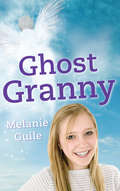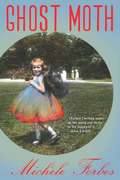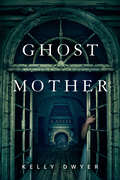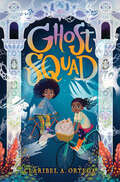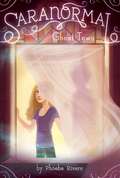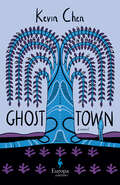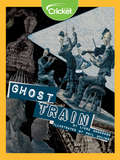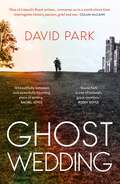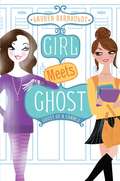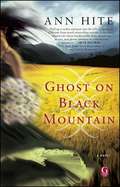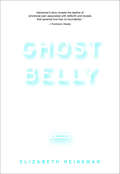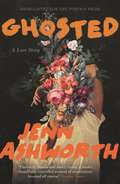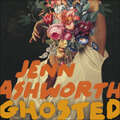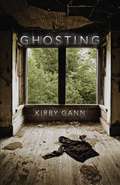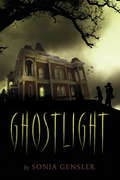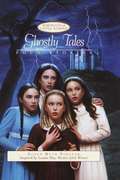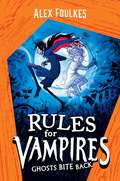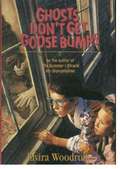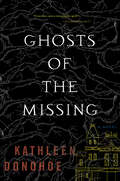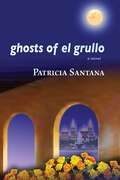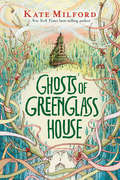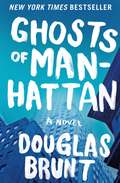- Table View
- List View
Ghost Granny
by Melanie GuileWhen Granny dies, everyone in the family heaves a sigh of relief. She was a difficult old woman and not easy to live with. So when the unmistakably transparent form of Granny appears at the tea table, both adults and children are alarmed. Why is Granny?s spirit so restless? It appears the young apprentice angel assigned to guide her spirit to heaven hasn?t been doing her job. Whether Granny goes upstairs or down below now hangs in the balance ? and Granny?s bad temper doesn?t help. The ensuing tussle between the devilish form of Mr. Brimstone and his bumbling angelic counterpart for the old lady?s soul leaves Granny in limbo and the family in crisis. When Granny?s ghost disappears, it?s left to young Anna, with a few angelic companions, to seek her at the very doors of Hellmouth. GHOST GRANNY by bestselling author Melanie Guile is a funny, fast-moving, and entertaining read with thoroughly engrossing characters.
Ghost Moth
by Michèle ForbesIrish Book Awards ShortlistConcord Monitor/Concord Insider Book of the WeekPublishers Weekly Best Summer Book Staff PickBrooklyn Book Festival Best Debut Book"Ghost Moth is an impressive debut by a writer who is not afraid to address the so-called ordinary lives of real human beings." -JOHN BANVILLE, Booker Prize-winning author of The Sea and Ancient Light"Clever, unpredictable, beautifully written and crafted." -RODDY DOYLE, Booker Prize-winning author of Paddy Clarke Ha Ha Ha and The Commitments"[Forbes'] writing soaks up the world, and thrills to the beauty of it." -ANNE ENRIGHT, Booker Prize-winning author of The Gathering and The Forgotten WaltzDuring the hot Irish summer of 1969, tensions rise in Belfast where Katherine, a former actress, and George, a firefighter, struggle to keep buried secrets from destroying their marriage. As Catholic Republicans and Protestant Loyalists clash during the "Troubles" and Northern Ireland moves to the brink of civil war, the lines between private anguish and public outrage disintegrate. An exploration of memory, childhood, illicit love, and loss, Ghost Moth is an exceptional tale about a family-and a country-seeking freedom from ghosts of the past.Born in Belfast, Northern Ireland, Michèle Forbes is an award-winning theater, television, and film actress who has toured worldwide with The Great Hunger and Dancing at Lughnasa. She studied literature at Trinity College, Dublin and has worked as a literary reviewer for the Irish Times. Her short stories have received both the Bryan MacMahon and the Michael McLaverty Awards. She lives near Dalkey, Dublin with her husband and two children. Ghost Moth is her first novel.
Ghost Mother: A Novel
by Kelly DwyerGhost Mother is a mesmerizing psychological ghost story that blurs the thin line between reality and delusion. "Ghost Mother has so many pleasures: a gorgeous old wreck of a house, a charmingly flawed and sympathetic heroine, supernatural goings-on so real they feel historical, an incredible sex scene, no spoilers, and an enthralling story. It's the perfect summer book." —Kate Christensen, PEN/Faulkner award-winning author of The Great Man and Welcome Home, Stranger Lilly Bly desperately wants to have a baby. She is struggling with infertility and bad spending habits when her husband, Jack, gets a new job that moves them from Chicago to a small town in Wisconsin. Impractical Lilly falls in love with a decrepit mansion well out of their price range—she is convinced that she will finally get pregnant and have a baby in this house—and Jack reluctantly agrees to buy the wreck. But when Lilly learns that her dream house was the site of a gruesome triple homicide/suicide in the 1950s, she begins to experience strange occurrences that soon lead her to believe the house is haunted. Are her ghostly encounters real, or is this a cascading mental breakdown? As Lilly learns more about the deaths and her visions become increasingly vivid, her relationship with Jack deteriorates, leading to a dramatic and irreversible climax.Perfect for fans of classic, gothic horror fiction, like Henry James&’s The Turn of the Screw and Shirley Jackson&’s The Haunting of Hill House, as well as contemporary suspense and horror fiction by everyone from Stephen King to Ruth Ware.
Ghost Squad
by Claribel A. OrtegaA New York Times bestseller!Coco meets Stranger Things with a hint of Ghostbusters in this action-packed supernatural fantasy.For Lucely Luna, ghosts are more than just the family business.Shortly before Halloween, Lucely and her best friend, Syd, cast a spell that accidentally awakens malicious spirits, wreaking havoc throughout St. Augustine. Together, they must join forces with Syd's witch grandmother, Babette, and her tubby tabby, Chunk, to fight the haunting head-on and reverse the curse to save the town and Lucely's firefly spirits before it's too late.With the family dynamics of Coco and action-packed adventure of Ghostbusters, Claribel A. Ortega delivers both a thrillingly spooky and delightfully sweet debut novel.
Ghost Town
by Phoebe RiversIn this start to a paranormal series, Sara’s new town has a lot of history—and a lot of ghosts who want to tell her all about it. Sara Collins is a normal twelve-year-old girl with an abnormal secret: She is psychic. She’s had her abilities for as long as she can remember, but she doesn’t like to talk about them. She hopes that if she ignores them, they might go away. Sara wants nothing more than to have a normal life, and to her, “normal” doesn’t include anything paranormal. But Sara’s life is about to be turned upside down, because she’s moving across the country with her dad to an old shore town in New Jersey. A shore town with a lot of history…and more than its fair share of ghosts roaming around. As Sara tries to settle into her new home, she discovers that for the first time, the ghosts around her can communicate with her. One ghost in particular desperately needs something from her and won’t leave her alone. Sara wants to help, but she’s scared. Can Sara put her fear aside and help the spirit? Will doing so put her in jeopardy? Meanwhile, Sara meets a great local girl named Lily Randazzo, and against all odds, really bonds with her. Sara has made a true friend for the first time in her life. Maybe New Jersey isn’t so bad after all….
Ghost Town
by Phoebe RiversIn this start to a paranormal series, Sara's new town has a lot of history--and a lot of ghosts who want to tell her all about it.Sara Collins is a normal twelve-year-old girl with an abnormal secret: She is psychic. She's had her abilities for as long as she can remember, but she doesn't like to talk about them. She hopes that if she ignores them, they might go away. Sara wants nothing more than to have a normal life, and to her, "normal" doesn't include anything paranormal. But Sara's life is about to be turned upside down, because she's moving across the country with her dad to an old shore town in New Jersey. A shore town with a lot of history...and more than its fair share of ghosts roaming around. As Sara tries to settle into her new home, she discovers that for the first time, the ghosts around her can communicate with her. One ghost in particular desperately needs something from her and won't leave her alone. Sara wants to help, but she's scared. Can Sara put her fear aside and help the spirit? Will doing so put her in jeopardy? Meanwhile, Sara meets a great local girl named Lily Randazzo, and against all odds, really bonds with her. Sara has made a true friend for the first time in her life. Maybe New Jersey isn't so bad after all....
Ghost Town: A Novel
by Kevin ChenA NEW YORK TIMES MOST ANTICIPATED BOOK OF FALL 2022 FROM THE BEST-SELLING AUTHOR & WINNER OF THE TAIWAN LITERATURE AWARD Keith Chen, the second son of a traditional Taiwanese family of seven, runs away from the oppression of his village to Berlin in the hope of finding acceptance as a young gay man. The novel begins a decade later, when Chen has just been released from prison for killing his boyfriend. He is about to return to his family’s village, a poor and desolate place. With his parents gone, his sisters married, mad, or dead, there is nothing left for him there. As the story unfurls, we learn what tore this family apart and, more importantly, the truth behind the murder of Chen’s boyfriend. Told in a myriad of voices, both living and dead, and moving through time with deceptive ease, Ghost Town weaves a mesmerizing web of family secrets and countryside superstitions, the search for identity and clash of cultures. ? “Multidimensional characters, a beautifully realized setting, and an apposite surprise ending... This book is excellent.”—Booklist (Starred Review)
Ghost Train
by Linda AndersonAccording to local legend, a ghost train passes through Jamestown at midnight every April 26th, the anniversary of the day President Lincoln's funeral train stopped in the town in 1865.
Ghost Wedding
by David ParkA POIGNANT STORY OF LOVE AND REGRET, FROM A MASTER OF CONTEMPORARY IRISH FICTION * 'David Park is one of Ireland's great novelists.' Roddy Doyle, author of The Commitments * For fans of Sebastian Faulks, Donal Ryan and Anne Tyler comes this beautiful novel following two troubled men, separated by nearly a century, bound by the ghosts of their past When George Allenby is put in charge of building a lake in the grounds of an imposing Irish manor house, he intends to do the job as swiftly as possible and return to Belfast. Allenby is still wrestling with his time as an officer during the First World War, burdened by the many things he could have done differently. Almost a century later, Alex and Ellie are preparing for their wedding, sparing no expense to hire a venue overlooking the very lake Allenby built all those years ago. Like Allenby before him, Alex is haunted by decisions he made in the past. Now, with the wedding drawing ever closer, he is at a crossroads. Telling the truth might free him from his guilt; it might also take away everything he cares about, including Ellie. In this masterful portrait of love and betrayal, David Park reveals the many ways the past seeps into the present: destructive, formidable, but also hopeful, in the moments of fragile beauty that remain.
Ghost of a Chance
by Lauren BarnholdtKendall takes drastic action when she encounters ghostly overwhelm in the third book in a tween series that Kirkus Reviews calls "bright, bubbly fun."Kendall feels like she's losing at life. The only people who will talk to her are ghosts, and she's exhausted from trying to fix their problems. Meanwhile, Brandon thinks she's a liar, her best friend thinks she's sneaking around with another boy, and her dad is getting serious with a new girlfriend. Kendall can't cope with anything else! Desperate for answers, she decides to visit the one person who might have them--the one person she never wanted to see again. Will her mom be able to help, or will Kendall be stuck without a wisp of hope?
Ghost of the Moaning Mansion (D. J. Dillon Adventure #8)
by Lee RoddyThe soft footsteps continued up the wall outside the bedroom door. In a moment, D.J. heard them start across the ceiling toward his bed! They passed over the bed and down the wall behind the headboard toward the window. D.J. couldn't stand it any longer! He swung the boot behind his shoulder, holding it cocked to smash for¬ward while he groped for the light on his nightstand. He switched it on. The wall was exactly the same as when he'd turned out the light a few hours ago--except--the footsteps continued. D.J. heard the window slide up. He heard it clearly. But with the light on, he could see the window hadn't moved!
Ghost on Black Mountain
by Ann HiteONCE A PERSON LEAVES THE MOUNTAIN, THEY NEVER COME BACK, NOT REALLY. THEY'RE LOST FOREVER. Nellie Clay married Hobbs Pritchard without even noticing he was a spell conjured into a man, a walking, talking ghost story. But her mama knew. She saw it in her tea leaves: death. Folks told Nellie to get off the mountain while she could, to go back home before it was too late. Hobbs wasn't nothing but trouble. He'd even killed a man. No telling what else. That mountain was haunted, and soon enough, Nellie would feel it too. One way or another, Hobbs would get what was coming to him. The ghosts would see to that. . . . Told in the stunning voices of five women whose lives are inextricably bound when a murder takes place in rural Depression-era North Carolina, Ann Hite's unforgettable debut spans generations and conjures the best of Southern folk-lore--mystery, spirits, hoodoo, and the incomparable beauty of the Appalachian landscape.
Ghostbelly
by Elizabeth HeinemanEveryone loves to blame a mother for making the "wrong" choices, and Elizabeth Heineman makes plenty of unpopular ones: being of advanced maternal age, having a home birth with a midwife, communing with her dead baby. In Ghostbelly, Heineman's brave, disarming, and stunning memoir, she recounts her indescribable grief after delivering a stillborn son, her shocking and intimate bonding with the baby's body before the burial, and the impossible task of saying goodbye.In 2008 Elizabeth McCracken's memoir broke the silence surrounding stillbirth, which account for one in 160 pregnancies in the United States. Now Ghostbelly provides a searing tale of motherhood, the need to invent our own rituals of grieving, and the unexpected space we occupy when birth and death coincide.
Ghosted: A Love Story
by Jenn AshworthA deeply affecting and unconventional love story, shot through with anger, black humour and grief. One ordinary morning, Laurie's husband Mark vanishes, leaving behind his phone and wallet. For weeks, she tells no one, carrying on her job as a cleaner at the local university, visiting her tricky, dementia-suffering father and holing up in her tower-block flat with a bottle to hand. When she finally reports Mark as missing, the police are suspicious. Why did she take so long? Wasn't she worried?It turns out there are many more mysteries in Laurie's account of events, though not just because she glosses over the facts. At the time, she couldn't explain much of her behaviour herself. But as she looks back on the ensuing wreckage - the friendships broken, the wild accusations she made, the one-night stand - she can see more clearly what lay behind it. And if it's not too late, she can see how she might repair the damage and, most of all, forgive herself.
Ghosted: A Love Story
by Jenn AshworthA deeply affecting and unconventional love story, shot through with anger, black humour and grief. One ordinary morning, Laurie's husband Mark vanishes, leaving behind his phone and wallet. For weeks, she tells no one, carrying on her job as a cleaner at the local university, visiting her tricky, dementia-suffering father and holing up in her tower-block flat with a bottle to hand. When she finally reports Mark as missing, the police are suspicious. Why did she take so long? Wasn't she worried?It turns out there are many more mysteries in Laurie's account of events, though not just because she glosses over the facts. At the time, she couldn't explain much of her behaviour herself. But as she looks back on the ensuing wreckage - the friendships broken, the wild accusations she made, the one-night stand - she can see more clearly what lay behind it. And if it's not too late, she can see how she might repair the damage and, most of all, forgive herself.
Ghosted: A Love Story
by Jenn AshworthA deeply affecting and unconventional love story, shot through with anger, black humour and grief. One ordinary morning, Laurie's husband Mark vanishes, leaving behind his phone and wallet. For weeks, she tells no one, carrying on her job as a cleaner at the local university, visiting her tricky, dementia-suffering father and holing up in her tower-block flat with a bottle to hand. When she finally reports Mark as missing, the police are suspicious. Why did she take so long? Wasn't she worried?It turns out there are many more mysteries in Laurie's account of events, though not just because she glosses over the facts. At the time, she couldn't explain much of her behaviour herself. But as she looks back on the ensuing wreckage - the friendships broken, the wild accusations she made, the one-night stand - she can see more clearly what lay behind it. And if it's not too late, she can see how she might repair the damage and, most of all, forgive herself.(P) 2021 Hodder & Stoughton Limited
Ghosting
by Kirby Gann"A novelist of daring creativity and passion."-Edmund WhiteA dying drug kingpin enslaved to the memory of his dead wife; a young woman torn between a promising future and the hardscrabble world she grew up in; a mother willing to do anything to fuel her addiction to pills; and her youngest son, searching for the truth behind his older brother's disappearance, are just some of the unforgettable characters that populate Ghosting, Kirby Gann's lush and lyrical novel of family and community, and the ties that can both bond and betray.Fleece Skaggs has disappeared, along with drug dealer Lawrence Gruel's reefer harvest. Deciding that the best way to discover what happened to his older brother is to take his place as a drug runner for Gruel, James Cole plunges into a dark underworld of drugs, violence, and long hidden family secrets, where discovering what happened to his brother could cost him his life.A genre-subverting literary mystery told from the alternating viewpoint of different characters, Ghosting is both a simple quest for the truth-what exactly happened to Fleece Skaggs?-and a complex consideration of human frailty.Kirby Gann is the author of the novels The Barbarian Parade and Our Napoleon in Rags (Ig Publishing, 2005). His short fiction has appeared in Witness and The Best of Witness, The Crescent Review, American Writing, The Louisville Review, Southeast Review, and The Southern Indiana Review, among other journals. Gann is managing editor at Sarabande Books and teaches in the brief-residency MFA in writing program at Spalding University.
Ghostlight
by Sonia GenslerThings that go bump in the night are just the beginning when a summer film project becomes a real-life ghost story! Avery is looking forward to another summer at Grandma's farm, at least until her brother says he's too old for "Kingdom," the imaginary world they'd spent years creating. Lucky for her, there's a new kid staying in the cottage down the road: a city boy with a famous dad, Julian's more than a little full of himself, but he's also a storyteller like Avery. So when he announces his plan to film a ghost story, Avery is eager to join in. Unfortunately, Julian wants to film at Hilliard House, a looming, empty mansion that Grandma has absolutely forbidden her to enter. As terrified as Avery is of Grandma's wrath, the allure of filmmaking is impossible to resist. As the kids explore the secrets of Hilliard house, eerie things begin to happen, and the "imaginary" dangers in their movie threaten to become very real. Have Avery and Julian awakened a menacing presence? Can they turn back before they go too far?
Ghostly Tales: Four Stories (Portraits of Little Women)
by Susan Beth PfefferLosing your way in the woods.... Prowling a castle in the dead of night.... Finding a treasure in a dusty attic.... Finding a frightening force in your own home.... The March sisters -- Meg, Jo, Beth, and Amy -- never imagined they'd encounter beings from the spirit world. But in each of these four new eerie stories, one of the March girls finds herself face-to-face with an inexplicable apparition. Could it be that ghosts really do exist?
Ghosts Bite Back (Rules for Vampires #2)
by Alex FoulkesRoald Dahl meets The Beast and the Bethany in this second exciting middle grade adventure following young vampire Leo as she strives to prove herself.A vampire and a ghost being friends is unheard of. It makes no sense. The two factions have despised one another for all eternity. But Leo the vampire and Minna the ghost have battled side-by-side: they&’re sisters-in-arms, they&’re best friends, and they&’ll have to work together to vanquish a new, deadly threat. Summoned to the Ghostly Realm for the murder of the Orphanmaster, Leo must complete three tasks to prove herself worthy of her unlife, each more treacherous than the last. Can Leo convince the Ghostly Realm of her innocence and earn her freedom, or will she be trapped there forever?
Ghosts Don't Get Goosebumps
by Elvira WoodruffVacationing on a farm in West Virginia near the haunted glass factory where crazy old Irwin Loop used to make marbles, eleven-year-old Jenna decides to use the place to shock her mute younger brother into talking.
Ghosts Of The Missing
by Kathleen DonohoeIn the vein of The Lovely Bones and The Little Friend, Ghosts of the Missing follows the mysterious disappearance of a twelve-year-old girl during a town parade and the reverberations of this tragedy throughout the town. On Saturday, October 28, 1995, a girl vanished. She was not a child particularly prized in town...When questioned by reporters, those who&’d known Rowan described her as &‘quiet&’ and &‘loner&’ and &‘shy&’ and even &‘awkward.&’ Words for pity.Culleton, New York has a long history—of writers, of artists, and of unsolved mysteries. It&’s where Adair grew up before she moved to Brooklyn to try to make it as an artist. But after years away from her hometown and little to show for it, Adair decides to return. She moves back in to Moye House, the old mansion, and current writer&’s retreat, imbued with her family's legacy. Ciaran is a writer staying at Moye House in the hopes of finally solving the mystery of what happened to Rowan Kinnane—his sister, and Adair&’s childhood best friend. As the two begin investigating, secrets long buried rise to the surface, complicating their sense of themselves and their understanding of what happened on that fateful day. With her &“knack for capturing heartbreaking moments with a gripping simplicity&” (Village Voice), Kathleen Donohoe lures us into a haunting world of secrets and obsessions and shows just how far people will go in search of the truth.
Ghosts of El Grullo
by Patricia SantanaHaving left her much-loved San Diego barrio, Yolanda Sahagún is now living in the university dorms when a series of events--her mother dies and her father sells their home--forces her to re-examine her life. Yolanda visits her parents' hometown of El Grullo, Mexico, struggling to understand the ghosts in her life--her mother, her father, and her seemingly idyllic childhood. She fears losing herself in the disintegration of the family. For Yolanda, her father is her enemy (or so she thinks), and in the course of the novel we see him at his best and worst, and we see Yolanda at her best and worst.This is a story of Yolanda's initiation into womanhood and about her fierce struggle to make sure her family does not dissolve. Family and sexual politics; love, death, and abandonment; the struggle to resolve a personal identity in the context of a shattered, first-generation immigrant American family--these are the hugely painful obstructions Yolanda must surmount or incorporate into her own being as she makes her life's journey. Ghosts of El Grullo is a sequel to Santana's critically acclaimed and prize-winning Motorcycle Ride on the Sea of Tranquility.
Ghosts of Greenglass House (Greenglass House)
by Kate MilfordWelcome back to the irresistible world of Greenglass House where thirteen-year-old Milo is, once again, spending the winter holidays stuck in a house full of strange guests who are not what they seem. There are fresh clues to uncover as friends old and new join in his search for a mysterious map and a famous smuggler’s lost haul. This exciting sequel to a beloved book that was praised in a starred review as "an enchanting, empowering read" is sure to thrill both fans and newcomers. Like its predecessor, it's a smart, suspenseful tale that offers ghosts, friendships, and a cast of unforgettable characters, all wrapped up in a cozy mystery.
Ghosts of Manhattan: A Novel
by Douglas BruntThis instant New York Times bestseller offers a withering view of life on Wall Street from the perspective of an unhappy insider who is too hooked on the money to find a way out, even as his career is ruining his marriage and corroding his soul.It’s 2005. Nick Farmer is a thirty-five-year-old bond trader with Bear Stearns clearing seven figures a year. The novelty of a work-related nightlife centering on liquor, hookers, and cocaine has long since worn thin, though Nick remains keenly addicted to his annual bonus. But the lifestyle is taking a toll on his marriage—and on him. When a nerdy analyst approaches him with apocalyptic prognostications of where Bear’s high-flying mortgage-backed securities trading may lead, Nick is presented with the kind of ethical dilemma he’s spent a lifetime avoiding. Throw in a hot financial journalist who seems to be more interested in him than in the percolating financial Armageddon and the prospect that his own wife may have found a new romantic interest of her own, and you have the recipe for Nick’s personal and professional implosion. By turns hilarious and harrowing, Ghosts of Manhattan follows a winning but flawed protagonist as he struggles to find the right path in a complicated urban heart of darkness
